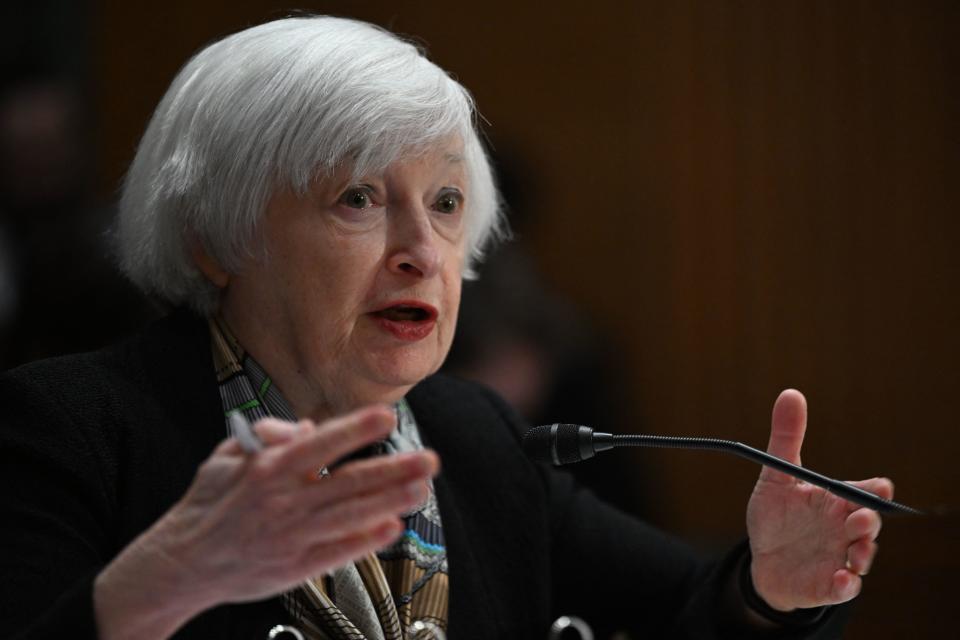Yellen tells Senate panel nation's "banking system is sound"
- Oops!Something went wrong.Please try again later.
Washington — Treasury Secretary Janet Yellen on Thursday sought to quell concerns from Congress that despite the collapse of two banks in the last several days and ongoing consumer jitters about the state of the financial services sector, the nation's banking system nonetheless remains strong.
In testimony before the Senate Finance Committee, Yellen touted the government's "decisive and forceful actions to strengthen public confidence in our banking system" after Silicon Valley Bank abruptly failed nearly one week ago and was taken over by the Federal Deposit Insurance Corporation (FDIC).
"I can reassure the members of the committee that our banking system is sound, and that Americans can feel confident that their deposits will be there when they need them," she said. "This week's actions demonstrate our resolute commitment to ensure that depositors' savings remains strong and that depositors' savings remain safe."
In response to the failure of California-based Silicon Valley Bank, federal regulators scrambled to craft a plan to bolster public's confidence in the soundness of the financial system and limit spillover effects. The Biden administration announced Sunday the emergency action it would take to shore up the banking system, which included ensuring depositors with accounts at Silicon Valley Bank would have access to all of their money.

Yellen highlighted in her opening comments the Treasury Department's work with the Federal Reserve and FDIC to protect all depositors and reiterated that taxpayers would not be bailing out Silicon Valley Bank's investors.
"Customers were able to access all of the money in their deposit accounts so they could make payroll and pay the bills," Yellen said, stressing that investors in those banks will not fare as well. "Shareholders and debtholders are not being protected by the government. Importantly, no taxpayer money is being used or put at risk with this action. Deposit protection is provided by the Deposit Insurance Fund, which is funded by fees on banks."
The plan rolled out by Yellen and top banking officials in the Biden administration also included a new lending facility set up by the Federal Reserve, called the Bank Term Funding Program. Yellen told senators the program "will help financial institutions meet the needs of all of their depositors."
Still, Sen. Ron Wyden, the chair of the committee, acknowledged the events of the last week in the banking sector have left Americans concerned, and said it underscores the need for Congress to raise or suspend the debt limit.
"Nerves are certainty frayed at this moment," the Oregon Democrat said in opening remarks. "One of the most important steps Congress can take now is to make sure there are no questions about the full faith and credit of the United States. That means paying the bills incurred by presidents of both parties and taking a default off the table."
Silicon Valley Bank, which was 40 years old and was the 16th largest bank in the U.S., catered largely to the tech industry and was used by many start-ups and venture capital firms. It is the largest financial institution to collapse since Washington Mutual at the height of the financial crisis in 2008.
In unveiling their emergency measures in response to Silicon Valley Bank's closure, federal banking officials also revealed a second institution, Signature Bank of New York, was taken over by state regulators Sunday.
Yellen said Silicon Valley Bank had to be closed after depositors rushed to withdraw money last week amid concerns about its balance sheet — which Sen. Mark Warner, a Virginia Democrat, said may mark "history's first internet-driven run."
"It had a high reliance on uninsured deposits and there was a massive withdrawal of deposits that led to liquidity problems," she said.
Yellen said U.S. financial agencies moved to intervene amid the fallout from Silicon Valley Bank's collapse and declare a systemic risk exception, protecting all depositors, because they recognized the risk of contagion.
"No matter how strong capital and liquidity supervision are, if a bank has an overwhelming run that's spurred by social media or whatever so that it's seeing deposits flee at that pace, a bank can be put in danger of failing," she said.
The circumstances that led to the failure of two banks in a matter of days is expected to be a major focus of Yellen's appearance before the finance panel, as well as inflation and the debt ceiling.
The Congressional Budget Office estimates the U.S. could be at risk of defaulting on its debt as soon as July if Congress doesn't lift or suspend the debt limit, setting up a high-stakes fight between President Biden and the House Republican majority.
While the White House is pushing Congress to approve a debt-limit increase with no conditions attached, House Speaker Kevin McCarthy and GOP lawmakers have said any deal must be paired with cuts to federal spending.
Yellen told senators that Mr. Biden is prepared to discuss limits on government spending but emphasized that negotiations over spending cuts should be separate from the debt limit fight.
"The debt ceiling simply must be raised, and to put at risk the full faith and credit of the United States, and to threaten to cause an economic and financial catastrophe isn't an acceptable requirement," she said.
On inflation, Yellen said in her opening testimony that there has been some moderation in headline inflation, but "more work needs to be done." In February, inflation cooled, but remains stubbornly high, at 6%. The Fed must decide soon whether to keep boosting interest rates to try to slow inflation, or to ease up because of the pressure higher rates exert on the banking industry.
Long COVID symptoms often include sleep disorders, study shows
Turkey's president backs Finland's bid to join NATO
Controversial French pension reform legislation pushed through without parliamentary vote

